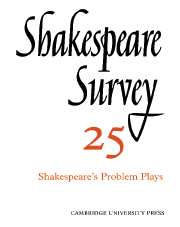Book contents
- Frontmatter
- The Problem Plays, 1920–1970: A Retrospect
- ‘Sons and Daughters of the Game’: An Essay on Shakespeare’s ‘Troilus and Cressida’
- The Options of the Audience: Theory and Practice in Peter Brook’s ‘Measure for Measure’
- Man’s Need and God’s Plan in ‘Measure for Measure’ and Mark iv
- The Design of ‘All’s Well That Ends Well’
- Directing Problem Plays: John Barton Talks to Gareth Lloyd Evans
- The Queen Mab Speech in ‘Romeo and Juliet’
- ‘Time’s Deformed Hand’: Sequence, Consequence, and Inconsequence in ‘The Comedy of Errors’
- Faith and Fashion in ‘Much Ado About Nothing’
- ‘The Merry Wives of Windsor’ as a Hallowe’en Play
- ‘The Tempest’ at the Turn of the Century: Cross-Currents in Production
- Variations Within A Source: From Isaiah XXIX To ‘The Tempest’
- The Life of George Wilkins
- A Neurotic Portia
- Of an Age and for All Time: Shakespeare at Stratford
- The Year's Contributions to Shakespearian Study 1 Critical Studies
- 2 Shakespeare’s Life, Times, and Stage
- 3 Textual Studies
- Index
- Plate section
3 - Textual Studies
Published online by Cambridge University Press: 28 March 2007
- Frontmatter
- The Problem Plays, 1920–1970: A Retrospect
- ‘Sons and Daughters of the Game’: An Essay on Shakespeare’s ‘Troilus and Cressida’
- The Options of the Audience: Theory and Practice in Peter Brook’s ‘Measure for Measure’
- Man’s Need and God’s Plan in ‘Measure for Measure’ and Mark iv
- The Design of ‘All’s Well That Ends Well’
- Directing Problem Plays: John Barton Talks to Gareth Lloyd Evans
- The Queen Mab Speech in ‘Romeo and Juliet’
- ‘Time’s Deformed Hand’: Sequence, Consequence, and Inconsequence in ‘The Comedy of Errors’
- Faith and Fashion in ‘Much Ado About Nothing’
- ‘The Merry Wives of Windsor’ as a Hallowe’en Play
- ‘The Tempest’ at the Turn of the Century: Cross-Currents in Production
- Variations Within A Source: From Isaiah XXIX To ‘The Tempest’
- The Life of George Wilkins
- A Neurotic Portia
- Of an Age and for All Time: Shakespeare at Stratford
- The Year's Contributions to Shakespearian Study 1 Critical Studies
- 2 Shakespeare’s Life, Times, and Stage
- 3 Textual Studies
- Index
- Plate section
Summary
On the upper slopes of Shakespearian textual studies, where the air is thin and advances are measured in proudly gained inches, Professor Kristian Smidt and Professor J. K. Walton are already familiar figures. Both have returned this year to the scene of previous struggles, the question of the copy for the Folio Richard III. As before, they propose different solutions, although Smidt’s support for the sixth Quarto, 1622, as providing the printed basis for the F text is attended with more qualifications than he once admitted, while Walton’s championship of the third Quarto, 1602, has become, if anything, more absolute, so that he now speaks of its use as copy for F not as hypothetical but as an established fact.
Their two books are of very different scope and character. Smidt's short monograph restates and reassesses the evidence bearing on the nature of the Q text of Richard III and on the identification of the particular Quarto used as copy for F. Walton's aim is more ambitious: by examining the whole body of Folio plays printed from Quarto copy, whether or not the Quartos were annotated, he sets out to create a new context for the discussion of those few plays in F about which no consensus of opinion yet exists as to whether they were printed from Q copy or from independent manuscripts, or as to the identity of the particular Quarto edition used for copy.
- Type
- Chapter
- Information
- Shakespeare Survey , pp. 193 - 200Publisher: Cambridge University PressPrint publication year: 1972



